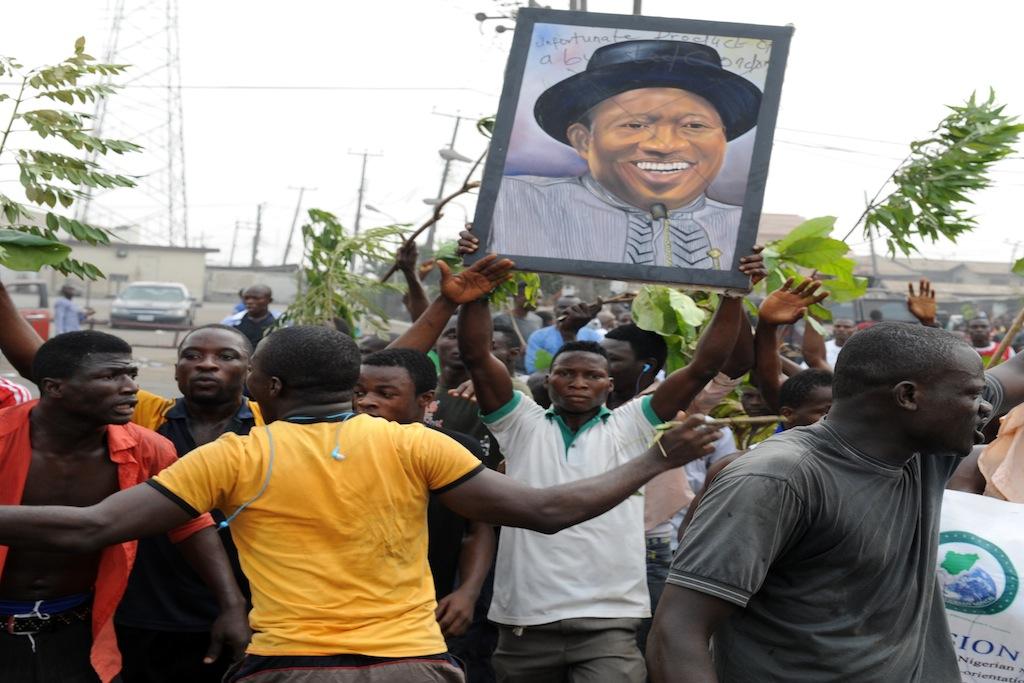Nigeria: Crises could make the country stronger
Protesters carry the portrait of Nigerian President Goodluck Jonathan during a protest against soaring petrol prices following government’s decision to abolish decades-old fuel subsidies, on Jan. 9, 2012 in Lagos. One protester was shot dead in Nigeria’s commercial capital Lagos during the national strike over fuel prices, a union leader said.
BOSTON — Nigeria, beset by two crises that threaten to tear the nation apart, may yet come out of these troubles stronger and with a more responsive government.
That is the view of Omoyele Sowore, a Nigerian analyst and activist in the United States.
“This is absolutely positive. The demonstrations across Nigeria are positive. People, young people, Christians and Muslims together, are demanding better government,” said Sowore, founder of Sahara Reporters. “They are demanding an end to corruption and mismanagement that has plagued Nigeria for more than 40 years.”
The protests that have rocked Nigeria for the past week have drawn inspiration from the Arab Spring demonstrations of North Africa as well as the Occupy Wall Street movement.
Read more on GlobalPost: Occupy Nigeria protest in Ibadan
“There are 70 million Nigerians with mobile phones. That’s more than Canada. They use Twitter and Facebook. They organized these demonstrations themselves," said Sowore to GlobalPost, while participating in an Occupy Nigeria demonstration in Washington, DC. "Nobody is waiting for CNN or The New York Times to tell their story. They are writing their stories themselves, and they are demanding better governance and an end to corruption. Now.”
Read more on GlobalPost: Amnesty International urges police restraint in Nigeria
Nigerians have not simply been protesting against fuel price increases, they have been demanding “an end to swindling politicians,” said Sowore.
The threat by the Islamic extremist violence of Boko Haram is related, said Sowore.
“Boko Haram is a symptom of corruption, mismanagement and unresponsive government. There are other rebel groups in Nigeria. Eastern Nigeria has the militants of MEND (Movement for the Emancipation of the Niger Delta) and kidnappers. There are vigilante boys in the cities.
“If Boko Haram were to be put down by the army and government today, another crisis would pump up due to corruption,” said Sowore. “The demonstrations won’t stop until we get better government.”
Read more on GlobalPost: Boko Haram attacks are getting worse
Nigeria is fertile ground for street demonstrations. The country has an unemployment rate of more than 23 percent, and this is concentrated in young people.
“Boko Haram is a manifestation of the dissatisfaction of the poor and unemployed,” said Sowore.
He is not the only Nigerian to see the violence of Boko Haram as an expression of the frustration of poor Nigerians with the lack of economic opportunities caused by decades of poor governance.
Read more on GlobalPost: Boko Haram Islamists have gov't support
Boko Haram's heartland, the remote, semi-arid northeast, is one of Nigeria’s country's poorest regions, where a miserable education system and high unemployment among the youth provide easy recruits for extremists.
Despite the dramatic increase in Boko Haram attacks, and the spread of their terrorist violence to the capital, Abuja, President Goodluck Jonathan’s reaction has been muted. Many criticize him for responding to the violence as just a security matter, instead of something requiring a political settlement.
"He's eerily calm, considering we could be weeks away from a major confrontation," said Patrick Smith, editor of Africa Confidential, to Reuters. "The absolute failure … to wheel on southerners and northerners at the same time to say this is a national crisis and we have to pull together, is striking."
Jonathan's biggest fear is that the army will split over the threat posed by Boko Haram, said Smith. The army’s upper ranks are all southern Christians, while junior officers and lower ranks come from a mix of many areas and includes both Christians and Muslims.
Read more on GlobalPost: Nigerian church bombs kill dozens on Christmas
"The next big faultline is the army, and how well they stay together,” said Smith. “If it splits, that is this country's nightmare."
Yet Nigeria’s current double crisis could force the country to forge a stronger, more accountable government.
By relenting on the fuel price increases, Jonathan may have shown that he is responsive to the people’s demands. There are many other challenges that he and Nigeria’s entire government system must deal with.
“The demonstrators who have come out onto the streets across Nigeria are demanding fundamental change,” said Sowore. “They are saying ‘No more corruption. No more swindling elite.’ This movement will continue.”
That is the kind of democratic expression that can result in better governance, and all Nigerians will benefit from that.
Read more on GlobalPost: Nigerian oil strikes called off by main unions
